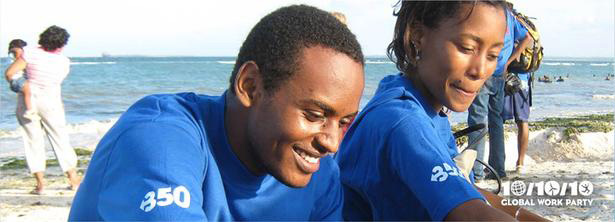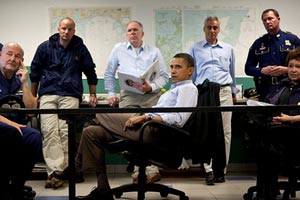The hot question in green circles these days is, “what next?” For the last decade, strategy has been built around getting a federal climate bill that would place a cap on carbon emissions. That attempt was supposed to culminate in success this year, but it didn’t, so… what next?
There will be much to say along those lines in coming months. I hope to share words of inspiration and uplift, to stir minds with insight and hearts with passion. To tell great tales of green pastures to come and the heroes who will sail the fleet of righteousness to the golden shores of, uh, the pastures. Just real quick, though, I need to be depressed as hell for a minute.
The House
Start with the fact that Democrats are going to get shellacked in the midterms. A new Gallup poll shows the GOP with the biggest lead in a generic midterm matchup in friggin’ history—10 points, 51 to 41 percent. Even if you take a single poll with a grain of salt (as you should), Pollster paints a grim picture:
Politico sees an approaching tidal wave.
At this point, the smart money is on Democrats losing the House. What will the GOP do with their shiny new majority? They’re not shy about it: They will launch a wave of investigations, inquiries, and witch hunts. An endless stream of allegations and subpoenas will be used to distract and slow the executive branch.
Remember the fevered madness around the Clinton administration in the late ’90s? Vince Foster assassinated? Clinton dealing drugs in Arkansas? The next two years will be like that, only worse. Republicans are even nuttier now than they were then, and the media is even less able to sift valid stories from ‘winger-generated pseudo scandals. It will be a circus. I put the odds of an impeachment effort at somewhere north of 85 percent.
The Senate
The GOP probably won’t take the Senate. They need 10 seats and Nate Silver sees them taking six or seven. Still, you thought it was tough to get to 60 votes for anything decent with 59 Dems? Try getting there there with 53. It won’t happen. The only things that can get to 60 under those circumstances are tax cuts for rich people and funding for military adventurism, both of which have broad support across the aisle, from conservative Republicans to conservative Democrats.
Though the Senate won’t change hands, it will change in composition. Sen. Lisa Murkowski has officially lost her race in Alaska, which means four Republicans on the Senate Energy and Natural Resources Committee will be leaving. As ranking Republican on the committee, Murkowski worked well with committee chair Jeff Bingaman (D-N.M.), always emphasizing bipartisanship and running a fairly civilized operation that actually led to some legislation being passed out of committee. It hasn’t been great legislation, and none of it has made it through the filibuster ringer, but in this political atmosphere at least that’s something. The next Republican in line is Richard Burr (N.C.), who seems unobjectionable [UPDATE: I was wrong about this; he’s both objectionable and vulnerable], but the departing Republicans are likely to be replaced by a newer breed who, as Politico delicately puts it, “may favor a harder line against federal environmental protections and would be less inclined to work with Democrats.” If you can imagine that.
Murkowski herself is no big loss. She made it clear over the last two years that she’s a concern troll— rhetorically, she supports bipartisanship and climate legislation, but when it comes time to act she lies and fights for polluters. Still, at least the illusion of bipartisanship and comity lived in the Energy and Natural Resources Committee. Now even that will be gone.
The late, lamented Democratic resurgence of 2006-2010 seems to have further radicalized the GOP on the subject of climate change and redoubled their fealty to oil and coal. At the moment there isn’t a single Republican senator willing to back a cap on carbon (there used to be three or four). Despite what everyone thought in 2007, the fight over the existence of climate change isn’t even over. A whole range of GOP candidates set to take the reins in 2010 are proud climate deniers.
The economy
Right now, Obama and Democrats aren’t very popular. Republicans are even less popular. Rage is afoot in the land and it has one source above all others: the crappy economy. Despite the twitterpated hyperventilating of political media about who’s winning news cycles, the various scandals and speeches and day-to-day dramas of political life are ephemeral. The electoral prospects of political incumbents track economic performance; if you know the latter, you can predict the former better than any political pundit.
This is not good news for Dems. Thanks to the insufficient initial stimulus, the Fed’s refusal to loosen monetary policy, and monolithic Republican opposition to measures that might ease the pain, the economic recovery is “sluggish.” Nobel-winning economist Paul Samuelson says, “I suspect we won’t see a recovery before 2012, and possibly even 2014.” Austan Goolsbee, chief economist for the White House Economic Recovery Advisory Board, says we need to “be mindful” of a double-dip recession. Even the overly optimistic CBO says:
CBO projects that the economy will grow by only 2.0 percent from the fourth quarter of 2010 to the fourth quarter of 2011; even with faster growth in subsequent years, the unemployment rate will not fall to around 5 percent until 2014.
The economy will determine the 2012 presidential race. If it’s still in the tank and unemployment is still in the 8-10 percent range, it’s entirely possible Obama could lose reelection, even to a clown like Sarah Palin or Newt Gingrich. Even under relatively optimistic 2012 scenarios, Republicans are likely to make further gains in the House. The 2012 Senate map is terrible; all the semi-miraculous class-of-2006 Dems are up for reelection and many face races that would be tough to win in a good year.
It’s possible that Republicans could come out of 2012 with the presidency, the House, and the Senate back in their hands, only a few short years after their stewardship brought America budget-busting tax cuts for the rich, unnecessary wars, and inaction on climate change. Whee!
Climate/energy action
Look at what Harry Reid is desperately trying to get through the Senate today: a pale shadow of an energy bill with no cap on carbon, no substantial investments in clean energy RD&D, and no renewable electricity standard. This wan and still-uncertain consolation prize comes at the end of a two-year process that began with a wildly popular president and huge majorities in Congress. It is what’s possible now.
What will be possible in a Senate with 47 Republicans? One has to conclude: nothing. There will be no climate legislation seriously limiting carbon emissions in the next two years. After that, there’s likely to be a Senate Republican majority. Will they return to the issue? With a new class of freshmen weaned on fighting “cap and tax”? It would take a truly extraordinary shift in direction for American conservatism, which seems unlikely given that its radicalism is paying electoral dividends.
So … maybe 2014? 2016? Meanwhile:
Global average atmospheric CO2 rose from 280 ppm at the start of the industrial revolution to 381 ppm in 2006. The present concentration is the highest during the last 650,000 years and probably during the last 20 million years. The growth rate of global average atmospheric CO2 for 2000-2006 … is the highest since the beginning of continuous monitoring in 1959 and is a significant increase over growth rates in earlier decades.
By 2016 my son will be a teenager and atmospheric CO2 will be flirting with 400 ppm.
So fine, federal legislation is unlikely, though the executive branch can do much more than it’s doing (PDF). The real hope for progress now lies in states and cities. People are going to have to start thinking in terms of how to make their own places, the communities where they live, better and cleaner. The best cure for climate depression is to attend one of 350.org’s work parties on 10/10/10. You’ll get your hands dirty and actually make something better, even if it’s only something small. And you’ll send a signal to everyone else out there who cares too. Looks like this thing’s gonna be done from the bottom up if it’s gonna be done at all.
 This piece was produced by Grist for the Climate Desk collaboration.
This piece was produced by Grist for the Climate Desk collaboration.











